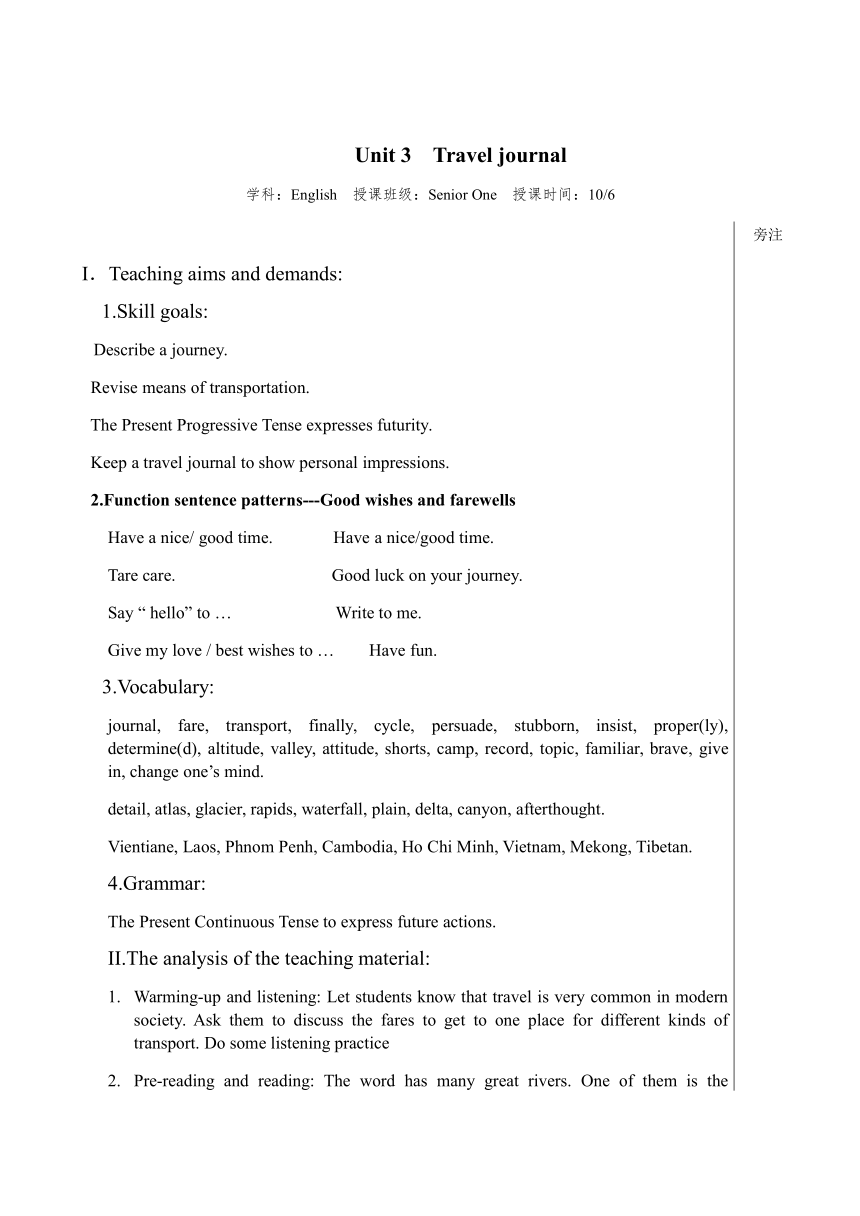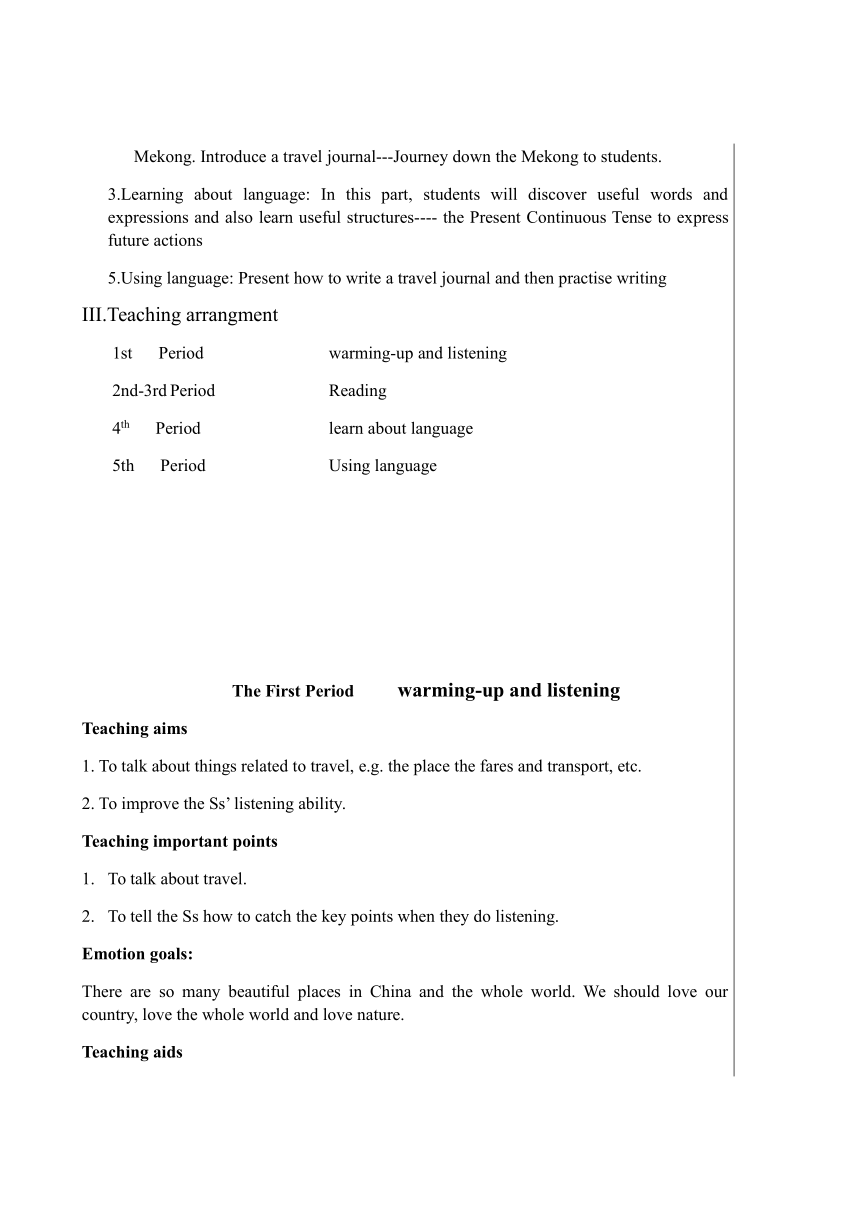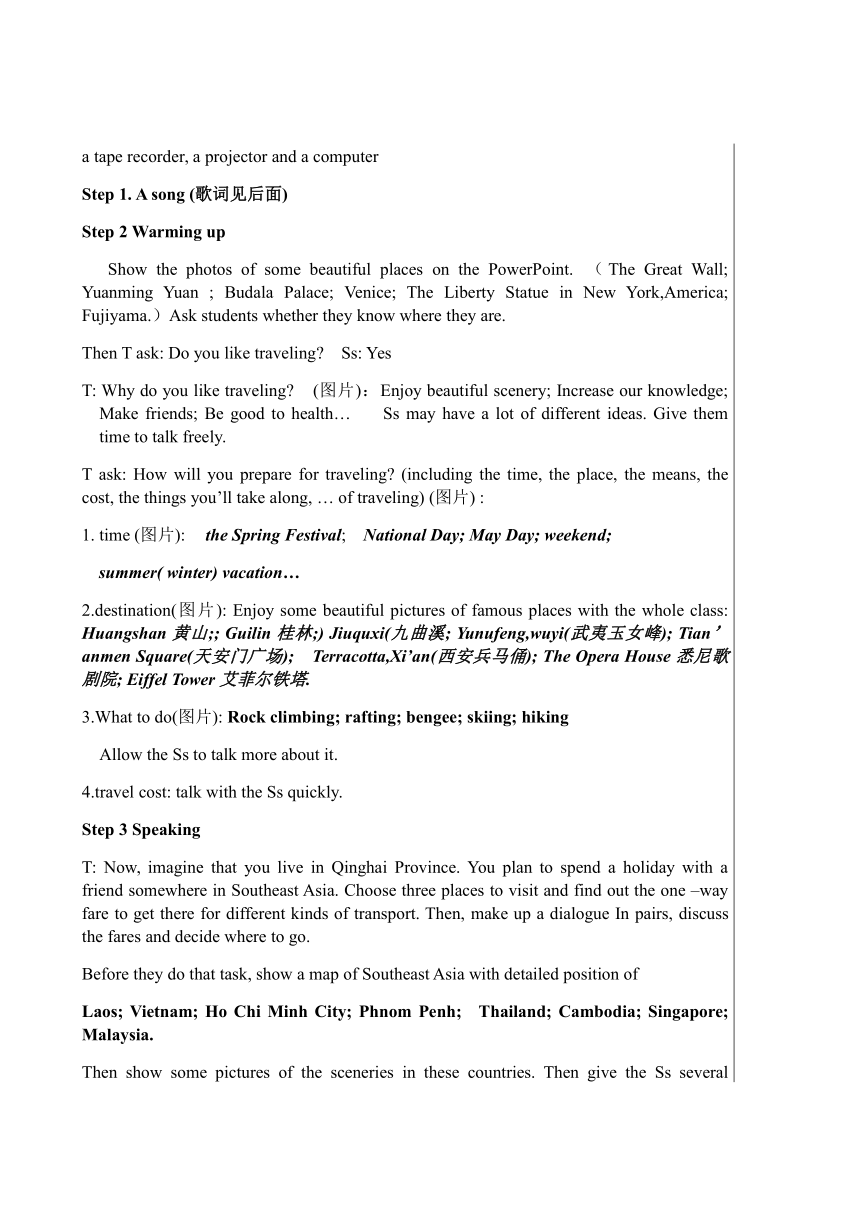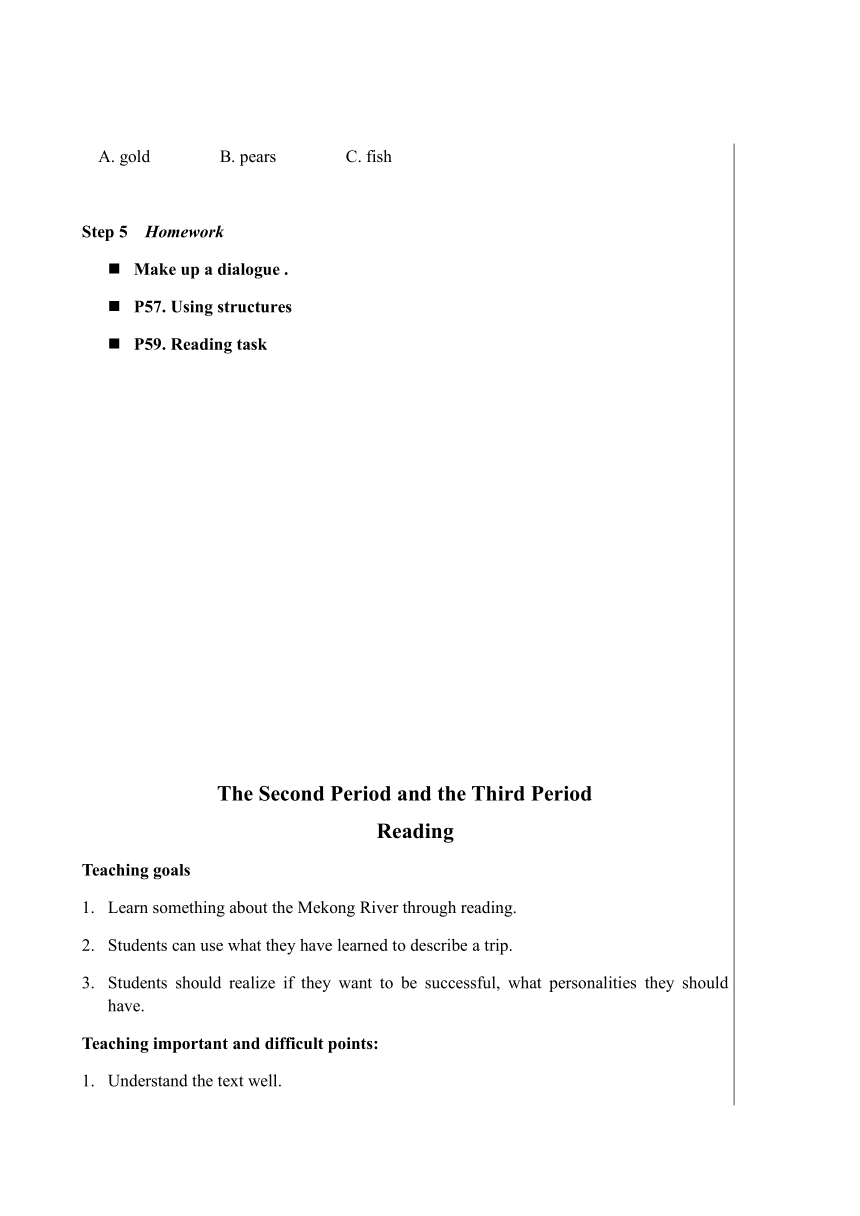高中高一英语人教版必修一Unit 3 Travel journal教学设计、教案
文档属性
| 名称 | 高中高一英语人教版必修一Unit 3 Travel journal教学设计、教案 |

|
|
| 格式 | zip | ||
| 文件大小 | 98.5KB | ||
| 资源类型 | 教案 | ||
| 版本资源 | 人教版(新课程标准) | ||
| 科目 | 英语 | ||
| 更新时间 | 2019-12-16 20:44:52 | ||
图片预览





文档简介
Unit 3 Travel journal
学科:English 授课班级:Senior One 授课时间:10/6
I.Teaching aims and demands:1.Skill goals: Describe a journey. Revise means of transportation. The Present Progressive Tense expresses futurity. Keep a travel journal to show personal impressions.2.Function sentence patterns---Good wishes and farewellsHave a nice/ good time. Have a nice/good time.Tare care. Good luck on your journey.Say “ hello” to … Write to me.Give my love / best wishes to … Have fun.3.Vocabulary:journal, fare, transport, finally, cycle, persuade, stubborn, insist, proper(ly), determine(d), altitude, valley, attitude, shorts, camp, record, topic, familiar, brave, give in, change one’s mind.detail, atlas, glacier, rapids, waterfall, plain, delta, canyon, afterthought. Vientiane, Laos, Phnom Penh, Cambodia, Ho Chi Minh, Vietnam, Mekong, Tibetan.4.Grammar:The Present Continuous Tense to express future actions.II.The analysis of the teaching material:Warming-up and listening: Let students know that travel is very common in modern society. Ask them to discuss the fares to get to one place for different kinds of transport. Do some listening practicePre-reading and reading: The word has many great rivers. One of them is the Mekong. Introduce a travel journal---Journey down the Mekong to students.3.Learning about language: In this part, students will discover useful words and expressions and also learn useful structures---- the Present Continuous Tense to express future actions 5.Using language: Present how to write a travel journal and then practise writingIII.Teaching arrangment 1st Period warming-up and listening 2nd-3rd Period Reading 4th Period learn about language 5th Period Using language The First Period warming-up and listeningTeaching aims1. To talk about things related to travel, e.g. the place the fares and transport, etc. 2. To improve the Ss’ listening ability.Teaching important points To talk about travel.To tell the Ss how to catch the key points when they do listening.Emotion goals:There are so many beautiful places in China and the whole world. We should love our country, love the whole world and love nature.Teaching aids a tape recorder, a projector and a computerStep 1. A song (歌词见后面)Step 2 Warming upShow the photos of some beautiful places on the PowerPoint. (The Great Wall; Yuanming Yuan ; Budala Palace; Venice; The Liberty Statue in New York,America; Fujiyama.)Ask students whether they know where they are. Then T ask: Do you like traveling? Ss: YesT: Why do you like traveling? (图片):Enjoy beautiful scenery; Increase our knowledge; Make friends; Be good to health… Ss may have a lot of different ideas. Give them time to talk freely.T ask: How will you prepare for traveling? (including the time, the place, the means, the cost, the things you’ll take along, … of traveling) (图片) : 1. time (图片): the Spring Festival; National Day; May Day; weekend; summer( winter) vacation…2.destination(图片): Enjoy some beautiful pictures of famous places with the whole class: Huangshan黄山;; Guilin桂林;) Jiuquxi(九曲溪; Yunufeng,wuyi(武夷玉女峰); Tian’anmen Square(天安门广场); Terracotta,Xi’an(西安兵马俑); The Opera House悉尼歌剧院; Eiffel Tower艾菲尔铁塔.3.What to do(图片): Rock climbing; rafting; bengee; skiing; hiking Allow the Ss to talk more about it.4.travel cost: talk with the Ss quickly.Step 3 Speaking T: Now, imagine that you live in Qinghai Province. You plan to spend a holiday with a friend somewhere in Southeast Asia. Choose three places to visit and find out the one –way fare to get there for different kinds of transport. Then, make up a dialogue In pairs, discuss the fares and decide where to go.Before they do that task, show a map of Southeast Asia with detailed position of Laos; Vietnam; Ho Chi Minh City; Phnom Penh; Thailand; Cambodia; Singapore; Malaysia.Then show some pictures of the sceneries in these countries. Then give the Ss several minutes to prepare for the dialogue and then call some of them to act their dialogues out. Step 4 Listening1.Listen to Part 3 CHATTING WITH A GIRL and tick the words .2. Listen again to the tape and fill in the chart3.Listen to Part 4 of JOURNAL DOWN THE MEKONG and tick the words you hear on the tape.4.Listen to this material again and answer the questions.(1)Who is telling the story? Wang Kun(2)When did Wang Wei meet her cousins? In October in Dali(3)Why didn’t they begin the journey in Tibet with Wang Wei and Wang Kun? The story doesn’t say(4)Find a word that describe how the person telling the story feels about travelling in Laos. Afraid,alone,excited,glad…5.Listen to Part 5. Wang Kun is describing a few of the things they saw during their tour. Pick out the correct in formation and then tell about their experience in Laos.In the village the cyclists saw ____B___. A. electric lights B. candle lights C. kerosene lights(2)After lunch they went to Vientiane ,the capital city of Laos by B. A. bike B. bus C. truck(3)They greeted an old man by ____A____. A. putting their hands together B. moving their heads C. waving their arms. (4) In Vientiane, they saw _____C_____A. trucks, buses and bicycles B. cars, motorbikes and buses C. trucks, buses, jeeps and motorbikes(5) The Mekong River is very rich in ____C__. A. gold B. pears C. fish Step 5 HomeworkMake up a dialogue .P57. Using structuresP59. Reading task The Second Period and the Third Period ReadingTeaching goalsLearn something about the Mekong River through reading.Students can use what they have learned to describe a trip.Students should realize if they want to be successful, what personalities they should have.Teaching important and difficult points:Understand the text well.Try to master the useful new words & expressions in this period.Teaching aids: a computer & a projectorTeaching proceduresStep 1 Warming UpT: Do you like travelling?Present some pictures of beautiful places to arouse their interest of travelling. Meanwhile, the teacher can also ask some more questions to make the students say something about their journey , such as their plans of trips, the difficulties they met in their journey and so on.Step2 Lead InT: Q1:Have you visited any river? Q2: How many great rivers do you know?Q3 : If you could travel down only one of them, which one would you choose? Why?Ask the students the locations of some famous rivers in the world .(Mekong, Rhein, Seine, Nile, Thames, Congo, Amazon, Mississippi, Volg)Step 3 Pre-readingT: Have you visited the Mekong River? If no, let’s learn something about it.1. Show a picture of the Mekong River and the brief introduction of it. Ask them:Can you list the countries that the Mekong River flows through?Enjoy the beautiful sights along the Mekong River to arouse their interest of it.Step 4 ReadingIn this step, get the students to read the text and finish some tasks.Task1: Scan the text quickly, then answer some questionsQ1. Who are Wang kun and Wang Wei?Q2.What are their dreams?Q3.Who are Dao Wei and Yu Hang?Q4. Is it a difficult journey to cycle along the Mekong? Why?Q5.What can you see when you travel along the Mekong River?Task2: Listen to the tape and pay attention to the pronunciation, then do the T or F exercise.1.Wang kun is a high school student. 2.Both Dao Wei and Yu Hang are Dai and they grew up in eastern Yunnan province 3.The source of Mekong is in Qinghai province .4.Finally Wang Kun agreed with his sister to cycle with her. 5.They found few atlas and books about Mekong River in library. 6. Mekong river begins at glacier on a Tibet mountain. the water there is clear but not cold. 7. Only a small part of the river is in China.8.As it enters Southeast Asia, it moves slowly.Task3: Careful readingRead the text again and try to complete a form.their dream Their journey Their preparation Task4: Consolidation Fill in the blanksMekong River begins ___ a glacier on a Tibetan mountain. At first ,The river is small and the water begins to move_______. It becomes ______as it passes ______ deep valleys. Traveling ______western Yunnan Province. Sometimes The River ______ wide Valley and becomes a_________. We were both surprised to learn that half of the river is in China . After it leaves china and the high altitudes, the Mekong becomes _____ , brown and warm. As it enters Southeast Asia, it travels slowly _________hills and low valleys, and the _____ where rice grows. at last the river’s delta enters the South China Sea.Step 5 Language pointsReading text: Para.1: 1. dream of / about doing 梦想,梦见(后接名词,代词,动名词) e.g. What a small world! I wouldn’t dream of meeting you here. 、2 finally, adv. 最后,终于final adj. 最后的,n (常用复数)决赛,期末考试e.g. We waited and waited, and the train finally arrived.3.persuade sb (not) to do, 说服某人(不)做…persuade sb that + clause 使某人相信Then she persuaded me to buy one.=Then she succeeded in asking me to buy one.e.g. The salesman persuaded us to buy his product. persuade sb to do sth 指成功地说服, “说而不服, 或说而无果”应用 advise sb to do sth / try to persuade sb to do 4.get / make sb interested in = interest sb, show interest in sth/ sbget+ n./pron.+adj.=make + n./pron.+adj.e.g. They didn’t get home after school as usual, which got/ made mother worried.Para.2: 5. Although she didn’t know the best way of… although “虽然,但是”,引导让步状语从句,不与but连用 though一般可与although互用,引导的让步状语从句有时用倒装语序.作副词时, “然而,可是”,通常放于句尾,并用逗号与句子隔开 e.g. Young though he is, he is very rich. He said he would come; he didn’t, though. 6.a way of doing/ to do * e.g. She didn’t know the best way of getting to places.= She didn’t know the best way to get to places.7. insist (若insist后面宾语从句的主语与主句的主语不一致,谓语由加动词原形构成,其中should可省略) insist that sb (should)do 坚持认为,坚持说insist on/upon sth/ doing 坚持做,坚决做e.g. We insisted that father (should) give up smoking.She insisted on/upon going to Beijing by air.8.care about, care for, care to do care about关心,忧虑 care for喜欢,照顾 care to do愿意/同意做某事e.g. I don’t care (about) what happens to him.Would you care for a drink?Would you care to go for a walk? 9.give sb a determined look, determined坚定的,坚决的e.g. They were determined to drive the enemy away from their country.=They determined to drive… determine to do= make up one’s mind to do, decide to do 10. change one’s mind, mind此处解“意见,想法”,[C] make up one’s mind 下定决心,拿好主意e.g. Once he has made up his mind, nothing can be done to change his mind.11. at a altitude of…* 在海拔…米处 at a altitude of 10,000 feet12. experience [U] “经验,感受” have experience in/at doing[C]“经历,体验”e.g. I’d prefer a lady with rich experience in/ at looking after babies. His experiences in Africa are interesting.13 give in 屈服,投降,让步 give in to sb 向某人让步,屈服于某人give up 放弃 give up doing/sthe.g. The mother gave in and bought a toy for her child. Don’t give up. You still have chances to win in the match.Para.3: 14. pass through through指从两边穿过或穿过空间内部, across指从一定范围的一边到另一边 “横跨”表面Step 6 Sentence focus: 1. It was my sister who first had the idea…强调句型:It is / was+被强调部分+ that/ who+其余部分注意:强调句中it不能更换,is/was与“其余部分”的时态一致,数不受被强调部分单复数的影响,被强调部分可以是除谓语以外的任何成分,被强调部分是人可用that/who,其它一律用that.被强调若是原句的主语,who/that之后的谓语动词在人称和数上与该主语一致。e.g. I saw John in the street this morning. ---- It was I who/that saw John in the street this morning. (强调主语) ---- It was John that/ whom I saw in the street this morning. (强调宾语) ---- It was in the street that I saw John this morning. (强调地点状语) ---- It was this morning that I I saw John in the street. (强调时间状语)2. She gave me a determined look---the kind that said…, the kind=the kind of look the kind是a look的同位语,后面是that引导的定语从句, 其中say指 “指明,表明”e.g The clock on the wall said a quarter to ten.3. Once she has made up her mind, nothing can change it.=When she has made up her mind, nothing can change it.once conj.一旦……(就), 一经……便……,相当于as soon as e.g. Once you understand the rule, you will have no difficulty.Translation: 钱一旦用完,我们该怎么办?What will we do once the money is gone/ used up?一旦做了,就要把事情做得最好.Once you do it, you should do it best.4. It becomes rapids as it passes through deep valleys, traveling across…traveling 是现在分词作伴随状语e.g. One big change in English…..American Dictionary of the English Language, giving American English its own identity.Step7 Post-readingTask1: Make comparisonAn attitude is what a person thinks about something. Make lists of Wang Wei’s and Wang Kun’s similar and different attitudes about the trip. Task2: DebateWhich character do you like,Wang Kun or Wang wei? Why?Task3: Understand two mottosLife is just a series of trying to make up your mind. Success belongs to the perseveringStep VI HomeworkRead the text again.Write a passage about their journey. The Forth Period Learning about languageTeaching goals 1.To revise the useful words and expressions.2. To learn useful structures--- the Present Continuous Tense to express future actions.Teaching important points the Present Continuous Tense to express future actions.Teaching difficult points How to use the Present Continuous Tense to express a plan or something to be done according to plan..Teaching aids a projector and a computerStep 1:Greeting : A song.Step 2:Practice一、Use the reading passage to find the correct word or expression for each of the following sentences.1.He is so stubborn that no one can ____________ him to do anything.2.A ___________ person always tries to finish the job, no matter how hard it is.3._______ she has made up her mind, nothing will ___________________.4.Is it_______ for us to take off our hats in church?5.He ________ that we find the source of the trouble as soon as possible. Everyone agreed.6.Do you remember every _____ of the story you have just read.7.I wanted to pay the train ____ , but my friend insisted. _______I gave in.8.She persuaded all of us to _______ to work instead of taking the bus。Answer: 1. persuade 2. determined 3. Once; change her mind 4. proper 5. insisted 6. detail 7 fare; Finally 8. cycle二、Match the words and the meaningsvalley a high place from which a river suddenly goes down.plain a fast-moving part of a river. waterfall a long, low, wide place between hills. delta the long place where a river enters the sea rapids a large body of ice moving slowly down a high valley canyon a large flat placeglacier a deep, very wide valley, usually with a river超级链接: some pictures of all these words to help Ss understand the meaning of the words more clearly.三、Complete this passage with some of the above words.I really enjoyed my school field trip in geography. We saw so many beautiful things: a _________ that flowed like a river of ice through a _______ that cut the mountains into two parts. We also discovered a river which fell off the mountains and become a wonderful __________this was even more exciting to see than the _______ where the water seemed to boil. Later we followed the river to a quieter ______ and finally into a ______ and the sea.Answer: glacier valley waterfall rapids canyon deltastep 3 : GrammarAsk the Ss to answer: What is she doing on Monday/Tuesday…? The Present Continuous Tense for future useThe present continuous tense can be used to express a plan or an arrangement.现在进行时可用来表示一个在最近按计划或打算要进行的动作;通常带一个表将来的时间状语, 但有明确的上下文时无须指出时间。能用进行时表将来的动词:go, come, leave, start, arrive, give, return, sleep ,stay, play, do, take, get, see off, travel, fly, drive, walk, reach, meet…Step4: Practice1. Look at the following dialogue and underline the verbs in this tense.A: Are you working this evening?B: No. We’re having an English party, don’t you know?A: Yes, I do. And we’re giving some performance at the party. What are you going to do?B: I’m singing song with my classmates.2. In the following dialogue, a newspaper reporter is interviewing Wang Wei about her plans for the trip along the Mekong River. However, they are not sure about some of the verb tenses. Please help them complete their conversation.R: Miss Wang. I hear that you _____________ along the Mekong River. That’s really exciting. Have you got everything ready?W: Almost.R:When are you _________ ?W:Next Monday.R: How far are you _______ each day?W:It’s hard to say. If the weather is fine, I think we’ll be able to ride 75km a day.R:Where are __________ at night?W: Usually in our tent, but sometimes in a small hotel in town.R: Do you think you are ______ back here soon?W:Oh, we __________ back to this place. We __________ home. That’ll be a month later.R:Thank you for your time, Miss Wang. Good luck on your journey!W:Thank you! Answer: are going to cycle ; leaving; cycling; you staying; coming; aren’t coming; are returning 1. First show an example: Where you going on holiday?A: Yanzi, where you going on holiday? B: I’ m going to Laos.A: When are you leaving? B: Next Sunday.A: How are you going to Laos? B: I’m taking a plane.A: How long are you staying there? B: About two weeks.A: Great. Have a good trip. B: Thanks.Farewells: Have a good trip/ journey; Have a good day/ time; Enjoy yourself; Best wishes; Have fun; Good luck; Take care!2. A game:Divide the class into two groups with one leader. Each group will need one coin and a counter.Procedure: 1. Show the Ss the board game. 2. Demonstrate the task: toss a coin and explain that one side of the coin means move two spaces, the other means move one space. Move your counter onto a square and speak for thirty seconds on the subjects of the square.Encourage questions. Step6:HOMEWORK1.Do exercises on Page 56, 572.Review The Present Continuous Tense ,then do exercises on Page57,58 Period 5 Using LanguageTeaching goals:1). To read the passage A NIGHT IN THE MOUNTAINS 2). To use the language by reading, listening, speaking and writing. Teaching important and difficult points:1).Improve the students’ writing ability.2).Enable the students to understand the passage better.Step 1 Lead-inEnjoy the music “青藏高原”Appreciate the beauty of Tibet.Ask students several questions about the pictures, e.g.What do you think of these pictures?What’s the weather like there?Do you want to go there? etc.Talking about Tibet.Have you ever been to Tibet? Do you want to travel in Tibet? Can you tell me something about Tibet?
Ss talk about itStep 2 Reading We know Wang Wei and Wang Kun have traveled down the Mekong. Today they have reached the Tibetan Mountains. They will stay there for a night. Now let’s look at the passage “A night in the mountains” on page 22. Read it quickly to find the main idea. Show some questions.1.How does Wang Kun feel about the trip now?2.What do you think has changed his attitude?3.Is it natural for Wang Kun not to feel lonely?4.Would you feel the same way in this situation? Why or Why not?Step 3 Listen and mark Let the students listen to the recorder and mark the rising and falling tone of each sense group and sentence. Then practice reading aloud. Pay attention to pronunciation and intonation.Step 4 DialogueSuppose Wang Wei and Wang Kun leave their camp the next morning and go on with the journey. Make a short dialogue between them. Sample dialogue :--Oh , up so early?--Early? It’s nearly 9 o’clock.--Oops! (Look at his watch). I guess you’re right.--Why were you so tired?--Well, I stayed up late last night to watch the stars.--That’s nice. They must be pretty.--Yes, they are.Then ask students to make up their own dialogues. They may discuss and practice in pairs.Step 5 Guided writing1.readingIn this unit, we have read the first two parts of a travel journal and have listened to the third part of the travel journal. What is the difference between a journal and a diary? Let’s read the passage on page 23 and find out the difference between the two.A diaryPersonals;To record how the writer feels very soon after things happen. A travel journalFor a lot of readers;Record the writer’s experiences ,ideas and afterthoughts about what they have seen;Its topics include people , things and events less familiar to readers.2 Writing a letter
Now let’s do a writing practice. Imagine that you are a friend of Wang Wei. Write a short letter to her and ask her to describe: how she feels, what she is doing, and some place you want to know about. Then wish her well on her journey by using at least two of these expressions:
Have a nice/good time. Have a nice/good trip. Take care.
Good luck on your journey. Say “Hello” to …. Write to me.
Give my best/love wishes to …. Have fun.
Tell the students that they can refer to the following steps.
In pairs. Choose the details from the journey that are most interesting. Think of what else you would like to know about the journey. Write these ideas down as questions.
Now choose two or three of the best questions for your letter. Each question should have another sentence explaining why you want to know this information.
Put them in an order that makes sense.
Begin your letter as shown in the textbook and add your questions for Wang Wei. Finish your letter as shown in the textbook.
A sample writing:
Hi, brave little Wei,
How I worry about you and Wang Kun! Do you have a good time now? I hope so. What are you doing now? Are you still in Laos? Can you tell me something about people’s life there? When are you leaving for Cambodia? When you get there, tell me about the Buddhist temples there. Please send some photos with your next letter! Well, Have a good trip and don’t forget to write to me! Give my best wishes to Wang Kun. Good luck on your journey.
Take care!
Yours,
Wang Lin
Step 6 HomeworkFinish writing the letterReview the whole unitRead the passage in workbook( page 59) “The end of our journey ”. 旁注
